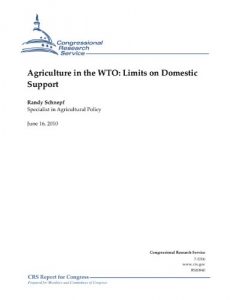Most of the provisions of the current farm bill, the Food, Conservation, and Energy Act of 2008 (P.L. 110-246), do not expire until 2012. However, hearings on the 2012 farm bill have already begun. Congress is in the process of reviewing farm income and commodity price support proposals that might succeed the programs due to expire in 2012.
A key question likely to be asked of virtually every new proposal is how it will affect U.S. commitments under the WTO’s Agreement on Agriculture (AA), which commits the United States to spend no more than $19.1 billion annually on domestic farm support programs most likely to distort trade. The AA spells out the rules for countries to determine whether their policies are potentially trade-distorting, and to calculate the costs. This report describes the steps for making these determinations.
A key question likely to be asked of virtually every new proposal is how it will affect U.S. commitments under the WTO’s Agreement on Agriculture (AA), which commits the United States to spend no more than $19.1 billion annually on domestic farm support programs most likely to distort trade. The AA spells out the rules for countries to determine whether their policies are potentially trade-distorting, and to calculate the costs. This report describes the steps for making these determinations.












